Related Research Articles
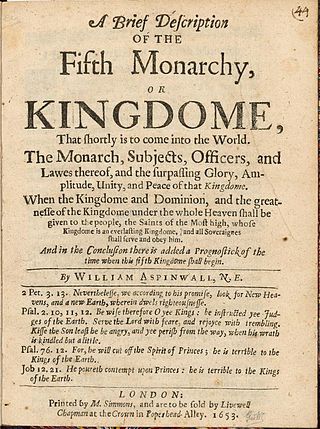
The Fifth Monarchists, or Fifth Monarchy Men, were a Protestant sect which advocated Millennialist views, active during the 1649 to 1660 Commonwealth of England. Named after a prophecy in the Book of Daniel that Four Monarchies would precede the Fifth or establishment of the Kingdom of God on earth, the group was one of a number of Nonconformist sects that emerged during the Wars of the Three Kingdoms. Perhaps its best known adherent was Major-General Thomas Harrison, executed in October 1660 as a regicide, while Oliver Cromwell was a sympathiser until 1653.
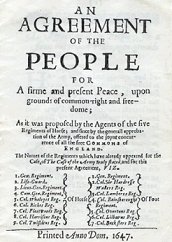
The Levellers were a political movement active during the Wars of the Three Kingdoms who were committed to popular sovereignty, extended suffrage, equality before the law and religious tolerance. The hallmark of Leveller thought was its populism, as shown by its emphasis on equal natural rights, and their practice of reaching the public through pamphlets, petitions and vocal appeals to the crowd.
The Ranters were one of a number of dissenting groups that emerged around the time of the Commonwealth of England (1649–1660). They were largely common people, and the movement was widespread throughout England, though they were not organised and had no leader.

The Diggers were a group of religious and political dissidents in England, associated with agrarian socialism. Gerrard Winstanley and William Everard, amongst many others, were known as True Levellers in 1649, in reference to their split from the Levellers, and later became known as Diggers because of their attempts to farm on common land.

The Putney Debates, which took place from 28 October to 8 November 1647, were a series of discussions over the political settlement that should follow Parliament's victory over Charles I in the First English Civil War. The main participants were senior officers of the New Model Army who favoured retaining Charles within the framework of a Constitutional monarchy, and radicals such as the Levellers who sought more sweeping changes, including one man, one vote and freedom of conscience, particularly in religion.
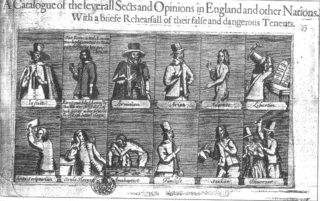
English Dissenters or English Separatists were Protestants who separated from the Church of England in the 17th and 18th centuries.

John Pordage (1607–1681) was a Church of England priest, astrologer, alchemist and Christian mystic. He founded the 17th-century English Behmenist group, which would later become known as the Philadelphian Society when it was led by his disciple and successor, Jane Lead.
Many religious denominations emerged during the early-to-mid-17th century in England. Many of these were influenced by the radical changes brought on by the English Civil War, subsequent Execution of Charles I and the advent of the Commonwealth of England. This event led to a widespread discussion about how society should be structured.
Major William Rainsborowe, or Rainborowe, was an officer in the English Navy and New Model Army in England during the English Civil War and the Interregnum. He was a political and religious radical who prospered during the years of the Parliamentary ascendancy and was an early settler of New England in North America.
Everard Digby was an English academic theologian, expelled as a Fellow of St John's College, Cambridge for reasons that were largely religious. He is known as the author of a 1587 book, written in Latin, that was the first work published in England on swimming; and also as a philosophical teacher, writer and controversialist. The swimming book, De Arte Natandi, was a practical treatise following a trend begun by the archery book Toxophilus of Roger Ascham, of Digby's own college.
Nathaniel Stephens (c.1606–1678) was an English clergyman ejected for nonconformity in 1662, who is now best known for his part in the early life of George Fox. He was a controversialist in the Presbyterian interest, engaging also with Baptists, and with Gerrard Winstanley, the universalist. In print he was a moderate, fair by the standards of his time to his opponents, and not bringing rancour to discussion of Catholicism.

William Everard was an early leader of the Diggers.
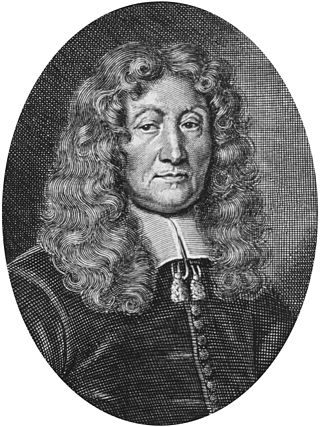
William Walwyn was an English pamphleteer, a Leveller and a medical practitioner.
Thomas Collier was an English General Baptist preacher, evangelist, and Arian polemicist.
Christopher Fowler (1610–1678) was an English ejected minister.
Thomas Grantham (1634–1692) was an English General Baptist minister, and theologian. He had access to Charles II of England, and made petitions on behalf of Baptist beliefs.
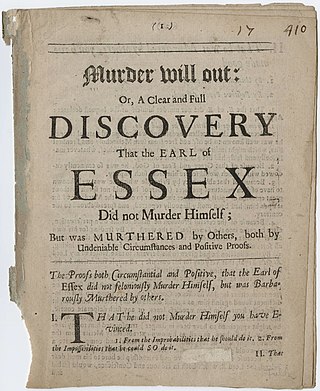
Henry Danvers was an English religious and political radical from Leicestershire. He sided with Parliament in the Wars of the Three Kingdoms, serving on the Committee for Staffordshire from 1647 to 1652 and as Governor of Stafford from 1650 to 1652, during which time he became a General Baptist. He also contributed to the constitutional manifesto known as An Agreement of the People and was nominated as MP for Leicestershire in the short-lived Barebone's Parliament of 1653. Following the 1660 Stuart Restoration, he was associated with numerous plots to overthrow the regime and died in Utrecht in 1687.

Peter Chamberlen M.D. (1601–1683), known as Peter the Third, was an English physician. The obstetrical forceps as invention has been credited to the Chamberlen family: the earliest evidence of what was a family trade secret points to his having it in 1630. He continued the family tradition of trying to bring the profession of midwifery under their control. His writings blend ideas associated with the Fifth Monarchists and Levellers with social schemes of his own with a utopian flavour.

Elizabeth Poole was a prophetess and writer.

Thomasine Pendarves was an English aspiring visionary prophet with influence on Abingdon Baptists. She was said to have deviant views and these were independent of her husband. Her writing on nature was anthologised in 2021.
References
- Gordon, Alexander (1898). . In Lee, Sidney (ed.). Dictionary of National Biography . Vol. 54. London: Smith, Elder & Co.
- Hessayon, Ariel (October 2009). "Everard, William (bap. 1602?, d. in or after 1651)". Oxford Dictionary of National Biography (online ed.). Oxford University Press. doi:10.1093/ref:odnb/40436.
- Attribution
 This article incorporates text from a publication now in the public domain : Cooper, Thompson (1889). "Everard, Robert". In Stephen, Leslie (ed.). Dictionary of National Biography . Vol. 18. London: Smith, Elder & Co.
This article incorporates text from a publication now in the public domain : Cooper, Thompson (1889). "Everard, Robert". In Stephen, Leslie (ed.). Dictionary of National Biography . Vol. 18. London: Smith, Elder & Co.